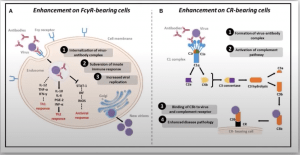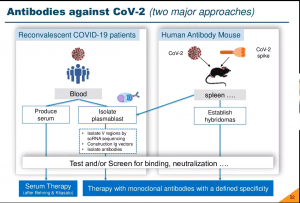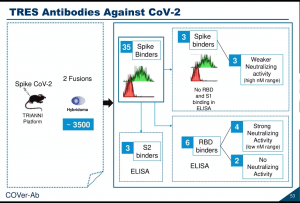In this week’s IUIS-Frontiers webinar series, Hans-Martin Jäck gave a talk on Prevention and Therapy of COVID-19 with Monoclonal Antibodies.
“He introduces the concept of passive immunisation and active vaccination to prevent and protect from COVID-19, and he provides an overview of the current clinical serum and vaccine trials, finishing the webinar with a review on the production of human CoV-2 neutralising antibodies in transgenic mice with an entirely human antibody repertoire. (Source: IUIS Website)”
Highlights of his talk include:
- Overview of vaccine developments strategies (https://vac-lshtm.shinyapps.io/ncov_vaccine_landscape/), including the first in human testing of the nucleic acid vaccine development strategy (Moderna). This vaccine strategy relies on cellular expression of vaccine targets proteins following uptake of extracellular DNA or RNA. Proteins are then taken up by dendritic cells which prime adaptive immune responses.
- Challenges with vaccines and vaccinations strategy, which include gaps in the knowledge of natural induced antibody immunity such as length of memory T and B cell survival. As well potential for antibody mediated enhancement of diseases as reported for SARS-CoV, MERS-CoV, Dengue and RSV
- Brief history of passive immunisation studies, including a Diphtheria serum therapy study conducted in the 1890s, and the development of antigen-specific monoclonal antibodies (1984 Nobel Prize in Physiology/Medicine). Read: Immunoglobulin Timeline for more details.
- Two major antibody approaches against SARS-CoV-2 (see image below)
- On-going collaborative research on SARS-CoV-2 (humanised) murine models. He presented data the describes the development of spike protein-specific monoclonal Abs that have neutralisation capacity.
*Images are from the webinar.
Summary by Cheleka AM Mpande













